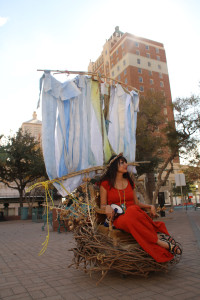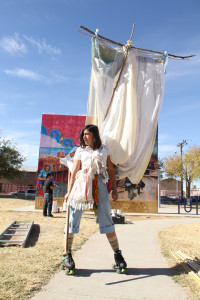Xochitl
The Art Avenue: How did growing up on the border influence your work?
Xochitl: I don’t know if I knew how growing up on the border affected me while I was growing up. It took me leaving, going as far away as I could possibly go, to understand how much of who I am is in me because of where I grew up. It took me leaving everything I thought I knew behind, to really understand it. My understanding of people, the way we reacte, the way we treat each other, the way “smaller” people relate to “bigger” people… I think in a really profound way, being from El Paso, helped me understand social justice on a really broad level, when I lived in Bhutan. It allowed me to understand HOW to identify what was wrong, what was unfair… and it was almost instinctual to know HOW to fix things. I could speak hybird languages-not because I’m from a city where “spanglish” is everywhere, but because I’m from a city where two worlds truly do coexist on every level.
I think we’re so fortunate to live in El Paso… so many things become innate. Our methods of communication are different, the way we understand demographics is different, the way we relate to the world is different. We’re not only a border between two nations, we’re at the epicenter of cultural, economic, and social exchange. It blows my mind all the time… and my work has definitely begun to focus on universal happenings that manifest really uniquely on our border…and at junctions of people, places, environments…
The desert has also taught me a thing or two… It is as unique and enchanting as anything I saw in the Himalayas.
The Art Avenue: What responsibility does an artist have in representing their culture or community?

Xochitl: I don’t know that I would necessarily say we have a responsibility to “represent” our culture– I think artists are the drivers, producers and custodians of culture. I think it’s important for artists, especially in city’s like ours that are forever running the risk of falling behind or being marginalized, to truly take a look around at what is really happening and produce work that affects what is happening. I think our people represent our culture… I would say I only want to be a reflection of it… reflections are much less decisive and concrete. Artists are the ultimate form of mighty, and our role in society is unmatched, which always makes me acknowledge how careful we have to be when we produce work that “represents” anything!
The Art Avenue: What artists are you influenced by or do you admire?
Xochitl: This list is always changing lately… as it should for any artist. I guess my favorite well-known artists to study in the last couple of years have been Ai Weiwei and Cai Guo-Quiang. I think work coming out of China has been really truly revolutionary and totally exciting.
I love Sway, for her delivery and relentless grace in producing work that tends to give a really fantastic metaphorical bird to institutions.
Tania Candiana, an amazing artist I met while I was at UTEP, has also been hugely influential for me. I don’t know if she knows it, but she helped engrain so many of my artistic principles into practice. I’m always exploring and finding new cravings…but these four are probably my biggest heroes.



